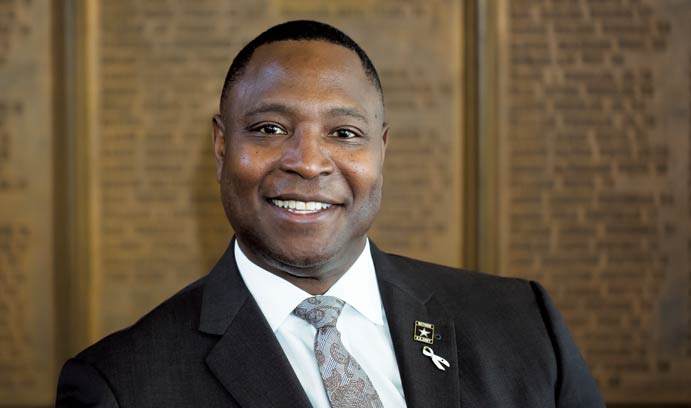Four Questions for Donald Outing

As Lehigh’s inaugural vice president for equity and community and the university’s diversity and inclusion officer, Donald Outing offers his perspective on the need to expand Lehigh’s efforts to cultivate a more diverse and welcoming campus climate.
Photo: Christa Neu
As Lehigh’s inaugural vice president for equity and community and the university’s diversity and inclusion officer, Donald Outing offers his perspective on the need to expand Lehigh’s efforts to cultivate a more diverse and welcoming campus climate.
What is your definition of diversity as it applies to Lehigh? Race? Socio-economic status? Age? Geography?
All of that informs our definition of diversity. People get confused by the difference between the definition and the tactical efforts to achieve it. My base definition is: the attributes, backgrounds and experiences of the students, faculty, staff and alumni that enhance the core mission of Lehigh. When we get into the makeup of the campus or the recruitment of students from underrepresented groups, we will focus efforts on areas like socioeconomic status, race, ethnicity, gender or generation. In this case, we would be looking at first-generation students–being the first in their families to attend colleges. But we also have to look at it from the composition of faculty and staff and broader representation in age groups.
What is the greatest opposition to this work?
One of the greatest obstacles is the implicit bias associated with diversity and inclusion work.
Oftentimes, there is an association with a “lowering of standards,” or that the word “diversity” is somehow synonymous with lesser quality.
I can have conversations with people about bringing in a more diverse student body and the question will immediately be, ‘Yeah, but will they be prepared to attend Lehigh?’ Also, there are historical perceptions about Lehigh that impede progress in diversity and inclusion that come in two forms: external and internal. Externally and internally, Lehigh has not been perceived as a welcoming community for underrepresented minority groups. Internally, there are factions that have resisted change for a variety of reasons.
How does diversity benefit the larger group, not just the subgroups we’ve talked about?
If you don’t develop, nurture and educate an individual in a heterogeneous environment, that student will lack the skills to be a successful leader in today’s 21st century, global workforce. Graduates must have the social skills to navigate that environment, and they can’t develop them if they always see other races or genders as the lesser and if those views haven’t been challenged. Essential to preparing these global leaders is a residential education where our students interact with diverse peoples, cultures, ideas and traditions. This is why we have to be intentional about improving the diversity of our student body, which is about 3 percent African American, 7 percent Asian American, and 8 percent Hispanic. This type of environment provides students the opportunity to learn from their faculty, staff and peers. If you are going to make a mistake, it should happen in an environment like this, where you can have the honest conversations and learn and appreciate different viewpoints.
What do you say to those who think Lehigh shouldn’t have to change?
Well, we can NOT change, but we will be irrelevant by 2030. The talent will not come here. It will go to other places that value diversity and inclusion and will welcome them. The demographics are changing, and that’s a reality we can’t ignore. They may be right in that we don’t have to change, but we will be irrelevant and illegitimate as an institution of higher learning.
Posted on:




